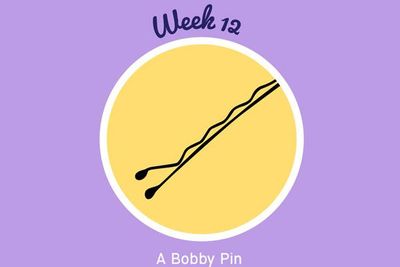During your 12th week of pregnancy, your baby is roughly the length of a bobby pin and getting bigger by the day. The muscles in her fingers, eyes and mouth are starting to become reflexive as she curls, clenches and makes sucking motions.
Tip of the week:
Coping with heartburn? Say no to any fatty, acidic or spicy foods. Try eating smaller, more frequent meals, and don’t eat too close to bedtime.
Her digestive system is also well on its way to being self-sustaining, as her intestines grow and move into her abdomen, and her kidneys begin to release urine into her bladder. Further up, her brain synapses are becoming more advanced, and the face that you'll soon know and love starts to take shape.
Some more subtle changes are also beginning to occur, as her bone marrow begins to produce protective white blood cells and her pituitary gland begins making hormones.
Meanwhile, your little one has moved from your pelvis to your lower abdomen, hopefully taking some of the pressure off your bladder. You can probably feel your uterus if you gently push the bulge between your hip bones.
Around week 12, you may want to talk to your health care professional about whether you should receive an amniocentesis, which is a test to detect any genetic disorders. The procedure is usually performed between weeks 14 and 20 of pregnancy and can be used later in your third trimester if there is a reason do to so.
During an amniocentesis, your health care provider will use an ultrasound to find a safe location from which he or she can extract some fluid from the amniotic sac using a needle. The collected liquid contains cells shed by your baby, and so, through a lab test, your physician may be able to determine whether any abnormalities are present.
An amniocentesis can tell you whether your baby has neural tube defects, like spina bifida, or chromosomal conditions like Down syndrome. When performed later in pregnancy, the test is usually meant to look for lung development. Additionally, amniocentesis is sometimes done to determine paternity.
An amniocentesis is usually recommended for women who are at increased risk for having a child with birth defects. This includes women who:
- will be 35 or older when the child is born
- had a screening test that indicated a possible problem
- previously gave birth to a baby with birth defects
- have a family history of genetic disorders.
Because there is a very slight chance—about 1 in every 200 to 400—of complications (including miscarriage) stemming from amniocentesis, you'll want to take time making the decision of whether to obtain one. Even if you are in the higher risk category, you do not have to get an amniocentesis; the decision is yours. Do as much research as you can, and be sure to talk about any concerns you may have with your health care provider and your partner.
Click here to learn about other prenatal tests.
Read more:
Keeping Weight Gain Under Control
Is an Amnio My Only Screening Option?
Starting a New Exercise Routine


